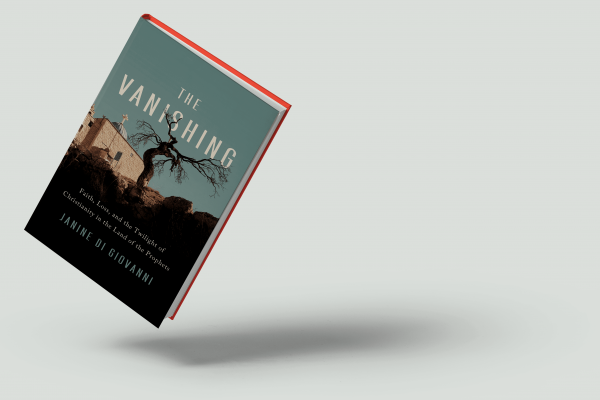THE SCENE APPEARS idyllic: “Golden sand, a vast red horizon, and shards of light scattered across the water.” But on this beach in Gaza, in Palestine, the mood is desperate. One man there describes Palestinian Christians as living artifacts of the 2,000-year-old Christian community in the Holy Land.
With grace and deep reporting, Janine di Giovanni, an acclaimed author and war correspondent, has captured the often overlooked plight of the dwindling Christian communities of the Middle East—specifically in Iraq, Syria, Egypt, and Palestine. The Vanishing is a tender if deeply disturbing travelogue, filled with stories told by Christians about the ferocious politics and desperate economics that shattered their communities. She writes in an elegiac tone while marveling at the resiliency of the few who remain.
Di Giovanni describes the trajectory of collapse, carefully providing the markedly different history of each country that nonetheless has led to similarly tragic outcomes. Christians in Syria were largely permitted to thrive during the Ottoman Empire, French colonialism, and after independence, only to be targeted in the latest war. In Egypt, home to some of the earliest Christian communities, Christians have become increasingly isolated, losing positions in business, education, and the medical profession. Radical Islamic gunmen have attacked convoys of Christian pilgrims and bombed churches. Christians do not feel protected by the government and are emigrating in record numbers. As one worshipper told di Giovanni, “When there is a bombing, it is always a coded message to Christians throughout Egypt: You are not welcome here.”
While di Giovanni does not dwell on the high-stakes geopolitics of the Middle East, she makes clear that Christians there feel they have few allies. The U.S. government is aware of the threats to Christians throughout the region, but Washington’s attention has centered elsewhere. Even the major U.S. Middle East aid commitment—multibillion-dollar aid programs to Egypt and Israel begun decades ago—has offered little help to the Christian communities in those countries and Palestine.
A Christian herself, di Giovanni is a sensitive witness, gathering revealing details. Palestinian Christians describe how sacred sites are essentially off-limits to them. While foreign Christian pilgrims are free to visit the Church of the Holy Sepulchre, the Via Dolorosa’s Stations of the Cross, the Mount of Olives, and the Garden of Gethsemane, Israel has forbidden the native Christians of Palestine to visit without permits, which are rarely given.
In Gaza, di Giovanni attends Mass at the Church of the Holy Family, a Roman Catholic congregation that once counted 4,000 Christians in its community and is now down to 117. The economics of Israeli occupation and the local leadership of Hamas is largely to blame. Highly educated, unemployed Christians are emigrating as the only choice for survival. Palestinian Christians have declined to no more than 1 percent of the population.
Di Giovanni writes: “It feels like an extinction.”
The Vanishing is an unexpected gift, preserving the story of the last remnants of Christian communities rooted in the region of the faith’s birth.
Sojourners has partnered with Bookshop.org; when you order books through the links on sojo.net, Sojourners earns a small commission and Bookshop.org sends a matching commission to independent bookstores.

Got something to say about what you're reading? We value your feedback!







